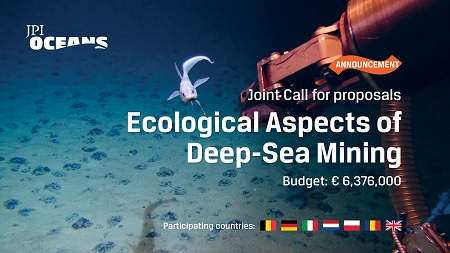
Register with Plumtri!
Register on plumtri as an Individual or as an Organisation to gain access to all of its useful features and remain updated on the latest R&I news, events and funding opportunities.
-
 Welcome to plumtriA platform for Research & Innovation
Welcome to plumtriA platform for Research & Innovation -
 Looking for Funding?Check out the current open calls
Looking for Funding?Check out the current open calls -
 Register today to start receiving our monthly newsletter
Register today to start receiving our monthly newsletter -
 Looking to partner up?Search our list of registered profiles
Looking to partner up?Search our list of registered profiles -
 You have questions on a particular funding programme?
You have questions on a particular funding programme?
New Joint Call on Deep-Sea Mining by JPI Oceans

With the support of Belgium, Germany, Italy, the Netherlands, Poland, Romania and the UK, JPI Oceans aims to further advance scientific knowledge in support of policy making on deep-sea mining, while facilitating the analysis of related ethical implications and societal consequences.
The scope of this joint call results from a yearlong process in which scientists, policy makers, industry, and NGO representatives as well as interested JPI Oceans members gathered to take stock of knowledge gaps and future research priorities. Exploring the potential of a successor activity to two previous phases of the JPI Oceans Joint Action on the ecological aspects of deep-sea mining, experts, policy makers, and interested JPI Oceans members gathered first in a scoping meeting on 11 October 2022. Several aspects of deep-sea mining impact were identified that require further or more detailed investigation. Following up, a meeting was set up with the ISA secretariat to identify the information needs from a policy perspective. This step was complemented by a stakeholder consultation workshop in which representatives from NGOs and industry were consulted to give their perspective on a third phase of the Joint Action.
As a result of these meetings and a brief review of recently published studies, the following issues have been identified as important scientific objectives in a successor phase:
Ecosystem dynamics
- Analyse the ecosystem functioning and food web architecture in the deep sea;
- Understand and assess ecosystem resilience;
- Understand the natural spatial and temporal trends and variability in the deep sea on a regional scale;
- Accounting of biodiversity and ecosystem goods and services in the deep sea.
Ecological impacts of polymetallic nodule mining
- Underpin the scientific evidence to establish threshold values that define serious harm and to develop indicators of ecosystem health;
- Investigate effectiveness of mitigation and potential restoration measures;
- Study longer-term and cumulative impacts on polymetallic nodule habitats by prototype collector trials;
- Develop a deep-sea digital twin and modelling approaches to enable a better predictive capacity and trade off analysis;
- Make a comparative analysis of terrestrial and deep-sea mining in terms of their socio-ecological footprints, forming a foundation for further societal discourse.
Ecological impacts of massive sulphide mining
- Characterise polymetallic sulphide-based ecosystems at inactive vent sites;
- Investigate abiotic parameters at hydrothermally inactive sites of massive sulphide deposits and neighbouring deep-sea habitats;
- Study the ecological impact of potential massive sulphide mining tests including the identification of test-sites;
Science-based support to governance
- Make a preliminary analysis of proposed governance and management regimes;
- Inform the definition and development of improved standards and guidelines for environmental baselines, monitoring, and impact assessment;
- Establish adaptive management tools and criteria for minimizing harmful impacts;
- Analyse ethical implications and societal consequences related to deep-sea mining.
While the previously funded MiningImpact II project studied ecological impacts of a pre-prototype polymetallic nodule collector vehicle (Patania II) exploitation test, in a follow-up phase fieldwork in one of the funded projects could be linked to a full-scale mining test which includes a riser system. Monitoring of the industrial equipment test should particularly aim at reducing the existing uncertainties with respect to the discharged sediment plume and its short- to long-distance impacts on the pelagic ecosystem through released substances, suspended particle concentrations, and eventually deposited blankets of displaced sediment.
In general projects are encouraged to inform the ongoing work of the International Seabed Authority and its members and consider opportunities to align their activities with the strategic research priorities of the ISA Action Plan for Marine Scientific Research.
Continue reading on the below link.
Information and image source:
External Link
